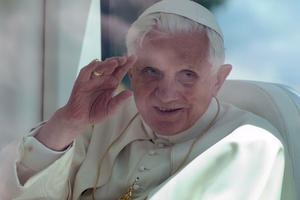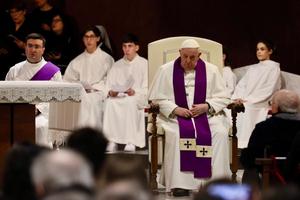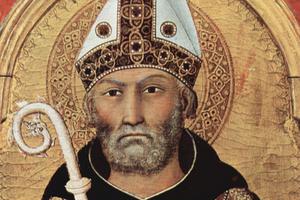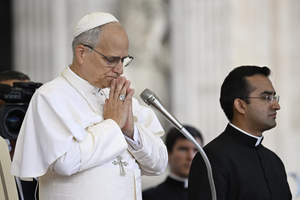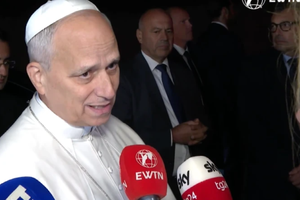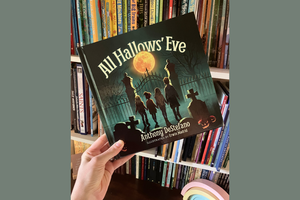‘Fire on the Altar’: A New Guide to Augustine’s Confessions
'When we see Pope Leo XIV weep holy tears before the Eucharist — the Doctor of Grace calls such tears 'the heart’s blood' — we can see something of the way that the Pope is a genuine son of Augustine.'
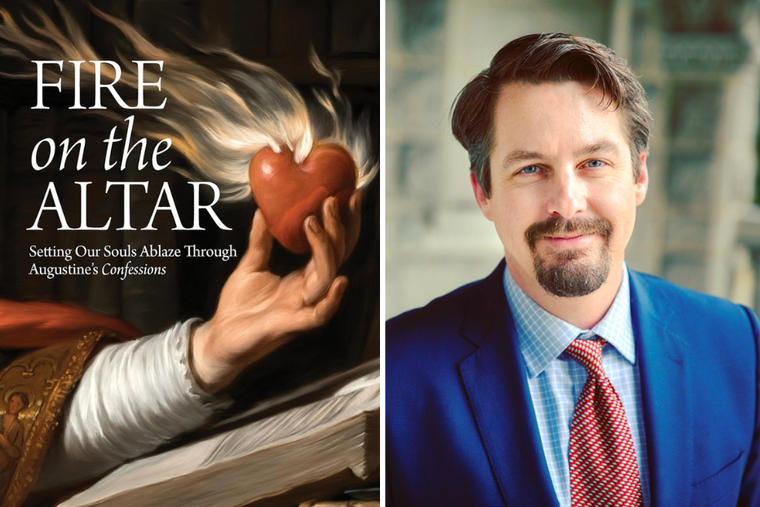
With an Augustinian pope in the Vatican, curiosity about Saint Augustine is heating up — making the recent release of Fire on the Altar: Setting Our Souls Ablaze through St. Augustine's Confessions, a new guide to his Confessions, especially timely. In his book, published by Emmaus Road, theologian Chad Pecknold shines a light on what modern scholars often miss in the saint’s most personal work — the importance of the sacraments of the Catholic Church in Augustine’s conversion.
Confessions is a spiritual autobiography that reflects on St. Augustine’s journey from sin to faith, highlighting how God's grace guided him throughout his life. Written as a prayer, it combines personal reflection with theological insight, emphasizing both the confession of sins and praise of God.
Augustine, Pecknold writes, taught that man is religious in nature: “You have made us for yourself, O Lord, and our heart is restless until it rests in you.” The title of his book, Fire on the Altar, refers to Pecknold’s emphasis on the importance of the Church in Augustine’s religiosity. Augustine “points to the divine fire that stirs our hearts to take joy in the altar of sanctifying sacrifice,” he writes.
Pecknold is a professor of historical and systematic theology at The Catholic University of America in Washington, D.C. He has authored or edited five books on Augustine’s theological and political thought.
The Register interviewed Pecknold about his new guide to Confessions.
As someone who has devoted much of his academic career to the study of Augustine, what were your first thoughts when you heard an Augustinian was chosen as Pope?
Like most people, I went through several waves of shock that we suddenly had an American pope, and a Leonine pope, and an Augustinian pope. As an American Augustinian theologian who has frequently championed the teaching of Pope Leo XIII — that shock felt very personal. And then the texts started coming in: “The Pope follows you on X.” I had no idea that Cardinal Prevost had been following me for years on social media, and so I immediately followed him back! But after these initial excitements wore off, silence washed over me. After more than a decade of struggling to understand God’s providence during the turbulent reign of Pope Francis, perhaps the time for peace had come.
Have you seen anything in Pope Leo’s spirituality that could be traced back to Augustine’s Confessions?
Like St. Augustine, Pope Leo XIV is a man of enormous spiritual depth — “deep calls to deep.” Augustine is famous for his interior depth, something which moderns often mistake for introspection. In Fire in the Altar I show that Augustine’s interiority is fundamentally “religious,” in that the inner chamber of his soul is restless until it is united to Christ’s Sacred Heart on the Church’s high altar. When we see Pope Leo XIV weep holy tears before the Eucharist — the Doctor of Grace calls such tears “the heart’s blood” — we can see something of the way that the Pope is a genuine son of Augustine.
Who is the intended audience for this book? Is it — and Confessions itself — accessible to those who haven’t read very much theology?
Augustine’s Confessions is itself an offering to God. The Lord is the primary audience, and I think this is partly why every generation for more than 16 centuries read and re-read the Confessions. It’s universally accessible because it is addressed to the One who is common to us all: God. Augustine’s Confessions is also universally accessible over millennia because it articulates something very close to the spiritual DNA of Western civilization. Christianity has permanently shaped the West, and Augustine gives us something like a plumbline for renewing our souls, our families, our nations, and civilization itself. So I tried to write with that universality in mind. On one level, it’s a Catholic guide to Augustine’s liturgical anthropology, but it works at a broader register as well. I wrote it as an offering to God as well, and I wrote to renew thought as well as prayer.
What do modern secularists tend to get wrong about Confessions?
It seems strange to ask what secularists get wrong about Augustine’s Confessions because it would be natural to suppose that secularists who have turned their backs on God would surely have no interest in Augustine! Yet you’d be surprised. From the mid-20th century onwards there was a veritable cottage industry of writers who tried to create an Augustine “safe” for liberal democracy. It’s natural to think that Augustine’s thought generated medieval Christendom. But the “secularist” reading of Augustine argued that he “invented the individual” or that he “invented the secular” and thus long before the French Revolution, he laid the foundations for modern individualism, or the separation of Church and State. The secularist reading of Augustine’s Confessions in particular tends to turn him into a 19th-century Romantic novelist, singing “the song of myself” instead of Ambrosian hymns within a fourth-century Milanese Cathedral. Fire on the Altar tries to correct this tendency — it is meant to situate yourself, and your reading of the Confessions, in the proper context: Church.
Your book is at once an intellectual treatise and a spiritual reflection on Augustine’s work. How has Confessions played a part in your personal faith journey?
My expertise as an Augustinian is really with his other masterpiece, The City of God Against the Pagans. That’s the work I have thought the most about, and the Eucharist is extremely central to my understanding of that work as well. So I decided to test my broader claims about Augustine’s understanding of the City by going back to his understanding of the Soul. So I started re-reading Augustine’s Confessions with a simple presupposition in mind: namely that it was fully Catholic, and so oriented to the offering of Our Lord upon the Church’s Altar. After all, the work was written by a man tied to the Altar — a priest and a bishop who presided over the Sacrifice of the Mass. This premise unlocked many things for my understanding of the Confessions, but it also had enormous implications for me spiritually. I started writing it during the pandemic when the whole world was on lockdown, caught in vicious cycles of cancellation after cancellation, alienated from one another, and alienated even from the Eucharist. The whole world seemed to have been knocked off the hinges of reality. So the Confessions became a kind of refuge and began to work upon me in a new way. I began to think about all this suffering — and where it all goes. Will the fire of all this suffering destroy us? Not just me, but us? And Augustine kept pointing me to that fire of Christ’s suffering, a fire which doesn’t destroy, but purifies and elevates us. So this became the central thing for me personally, as well as universally: Orient our souls, our families, our nations, and our world to the fire on the altar.
In your book, you write that we should rejoice when we acknowledge the sin in our hearts because it is a sign that God is at work within us. Yet today, we rarely hear sin mentioned from the pulpit. Has the Church moved away from one of its most powerful tools for bringing people to faith?
One of the first things that shocked me in pursuing my thesis was the discovery that Augustine regarded his sins as “food for demons.” That’s just not something most Catholics today would ever even think, let alone say. He hated his sins, and no matter how much you think you hate sin, you don’t hate your sins enough. Sin is something which disintegrates your good, the good of your family and friends. It disintegrates everything we rightly love, and so we should regard it as a mortal enemy. But the post-conciliar Church wanted to build a bridge to a liberal world by avoiding or at least downplaying both sin and error. Those old anathemas by which the Church once condemned errors were out, and a new emphasis on “mitigating circumstances” which “reduce culpability” for sin was in. The idea of sin as “food for demons” was something “outdated,” or insufficiently “pastoral.” Augustine does not allow us these comforting half-truths. He makes us own our sins and hate them. But he also shows us that repentance is the foundation for the true happiness we seek.
- Keywords:
- confessions
- st augustine





